Teseq NSG 3060
Included Accessories
Can't find something? Contact UsRelated Equipment
Teseq’s new NSG 3060 conducted immunity generator takes the proven, user-friendly design of the highly successful Modula series to a new level. This innovative design uses modular architecture to provide a versatile system that can be configured for basic testing needs and expanded to meet the needs of sophisticated test laboratories.
Designed to fulfill requirements for CE mark and ANSI C62.41 testing, the NSG 3060 performs tests for Combination wave surge, Ring wave and Electrical Fast Transient (EFT) pulses as well as Power Quality Testing (PQT). Extensive expansion capabilities enable the system to be configured for a much broader range of applications.
New pulse generator modules can be added to the original system quickly and easily with the NSG 3060’s unique “Master-Slave” concept. This technology allows individual pulse modules to be calibrated separately with the calibration data and correction factors stored on the slave controller. New modules can be installed with no need to return the entire system for calibration.
Using state of the art components, the self-contained modules set new standards with respect to switching and phase accuracy and exceed the existing standards’ requirements. With its powerful processors, the NSG 3060 can completely fulfill the unique coupling requirements specified by ANSI C62.41. This standard requires that the pulse amplitude be adjusted for the phase position of the pulse on the AC mains, and for the amplitude of the mains voltage.
A 7” touch panel display with superb contrast and color is the most striking feature of the new NSG 3060. For fast and efficient data entry, input devices include an integrated keyboard and a thumbwheel with additional keys for sensitivity adjustment.
The user-friendly graphic display speeds test setup. Each parameter’s value is highly visible and all settings can be quickly selected and modified with the generously sized touch input buttons. A stylus is not necessary, and ramp functions are programmed quickly and easily. Multi-step test procedures can be created and their sequence or parameter values changed easily.
With Expert Mode users can make manual parameter changes using the thumbwheel while a test is under way, providing an effective and fast method for identifying critical threshold values. The Test Assistance (TA) function allows users to initiate standardized test with just a few “clicks” to achieve quick, reliable results in a development environment.
An easily accessible SD memory card allows firmware downloads to be performed quickly and tests to be saved. In the rare case that storage space is not sufficient, the card can be replaced by a commercially available SD memory card and existing test files can be easily copied onto the larger SD card.
- Specifications
- Combination Wave:
- Standard:
- Pulse conforms to IEC/EN 61000-4-5
- Pulse voltage (open circuit):
- 200 V +/- to 6.6 kV (in 1 V steps)
- Pulse current (short circuit):
- 100 A +/- to 3.3 kA
- Impedance:
- 2/12 Ohms
- Polarity:
- positive / negative / alternate
- Pulse repetition:
- 5* to 20 s, up to 600 s (in 1 s steps) * derated depending on selected pulse voltage and EUT supply voltage
- Test duration:
- 1 to 9999 pulses, continuous
- Phase synchronization:
- asynchronous, synchronous 0 to 359 degrees (in 1 degree steps)
- Coupling:
- ANSI / IEC / externa
- Burst/EFT
- Standard:
- Pulse conforms to IEC/EN 61000-4-4
- Pulse amplitude:
- 200 V +/- to 4.8 kV (in 1 V steps) - open circuit
100 V +/- to 2.4 kV (50 Ohm matching system) - Burst frequency:
- 100 Hz to 1000 kHz
- Polarity:
- positive / negative / alternate
- Repetition time:
- 1 ms to 4200 s (70 min)
- Burst time:
- 1 us to 1999 s, single pulse, continuous
- Test duration:
- 1 s to 1000 h
- Phase synchronization:
- asynchronous, synchronous 0 to 359 degrees (in 1 degree steps)
- Coupling:
- ANSI / IEC / external
- Dips and drops
- Standard:
- conforms to IEC/EN 61000-4-11, IEC/EN 61000-4-29
- Dips & drops
- From EUT voltage input to 0 V, 0%
- Uvar with optional variac:
- depending on model (VAR 650x)
- Uvar with step transformer:
- 0, 40, 70, 80% (INA 650x)
- Peak inrush current capability:
- 500 A (at 230 V
- Switching times:
- 1 to 5 us (100 ? load)
- Event time:
- 20 �s to 1999 s, 1 to 99�999 cycles
- Test duration:
- 1 s to 70,000 min, 1 to 99,999 events, continuous
- Repetition time:
- 40 �s to 35 min, 1 to 99�999 cycles
- Phase synchronization:
- asynchronous, synchronous 0 to 359 degrees (in 1 degree steps)
- Ringwave
- Standard:
- Pulse conforms to IEC/EN 61000-4-12 and ANSI (IEEE) C62.41
- Pulse voltage (open circuit):
- Pulse current (short circuit):
- 16.6+/- to +/-550 A, +/-10%
+/-6.6 to +/-220 A, �10%
+/-1 to +/-33 A, +/-10% - Impedance:
- 12/30/200 Ohms
- Polarity:
- positive / negative / alternate
- Pulse repetition:
- 5* to 20 s, up to 600 s (in 1 s steps) * derated depending on selected pulse voltage and EUT supply voltage
- Test duration:
- 1 to 9999 pulses, continuous
- Phase synchronization:
- asynchronous, synchronous 0 to 359 degrees (in 1 degree steps)
- Coupling:
- ANSI / IEC / externa
- Coupling Network CDN 3061
- Instrument supply:
- 230/115 VAC
- Decoupling attenuation:
- Remanent pulse 15% max. Mains side crosstalk 15% max.
- Mains decoupling:
- 1.5 mH 0% + 35%
- Connections:
- Pulse input from generator
Cable connector for EUT supply
Power inlet for CDN - EUT supply:
- 1-phase
- EUT VAC:
- 24 to 270 Vrms, 50/60 Hz (phase - neutral), 400 Hz max
- EUT VDC:
- 0 to 270 VDC
- EUT current:
- 1 x 16 Arms continuous (temperature controlled)
1 x 25 Arms for 30 min - EFT (Burst):
- Standard coupling all lines to ref ground (GND) IEC/EN 61000-4-4 and ANSI (IEEE) C62.41
Any lines and combinations to ref GND: - Combination wave pulse:
- IEC/EN 61000-4-5
- Combination wave & ring wave:
- ANSI (IEEE) C62.41
- Ring wave:
- IEC/EN 61000-4-12 - 12/30/200 Ohms
- PQT:
- Dips & drops to phase L


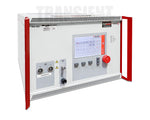
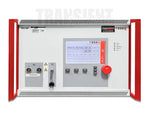
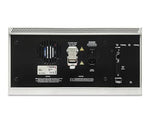
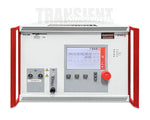
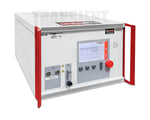
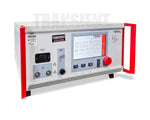
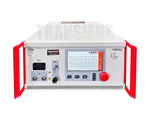
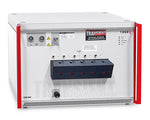
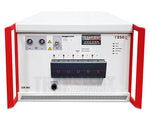
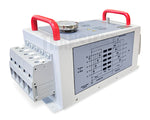
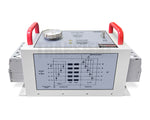
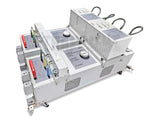
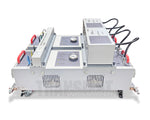
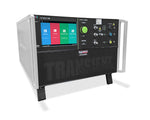
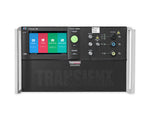
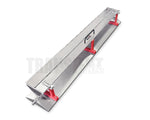
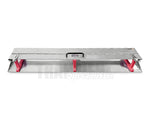
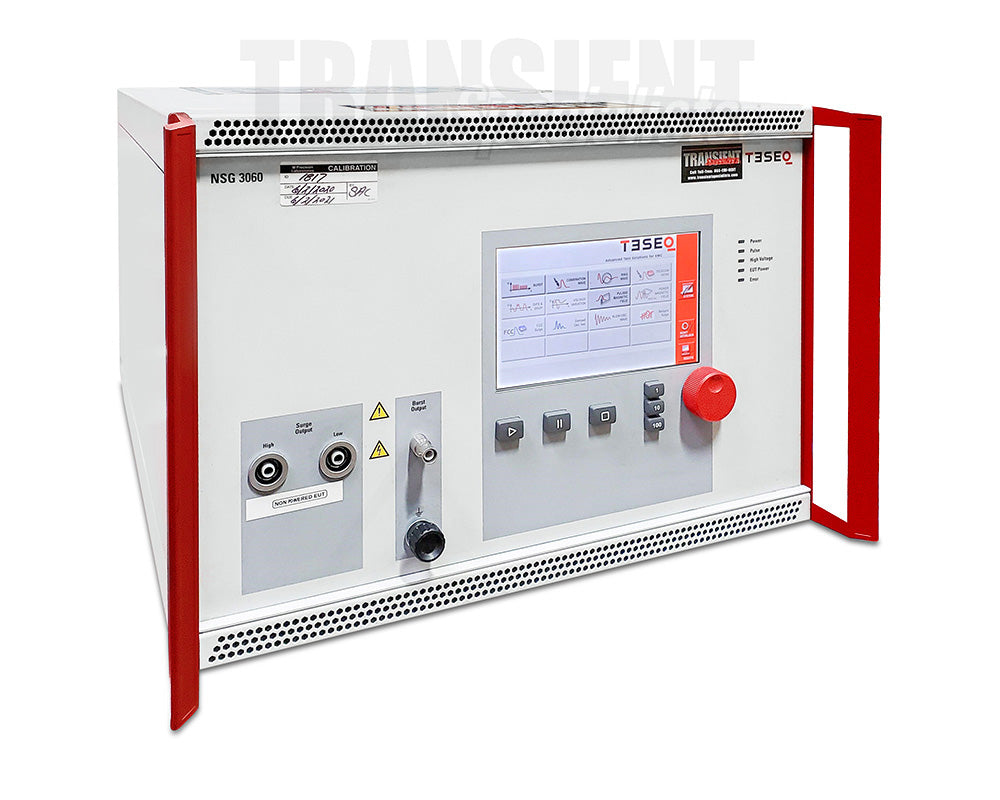

 info@transientspecialists.com
info@transientspecialists.com